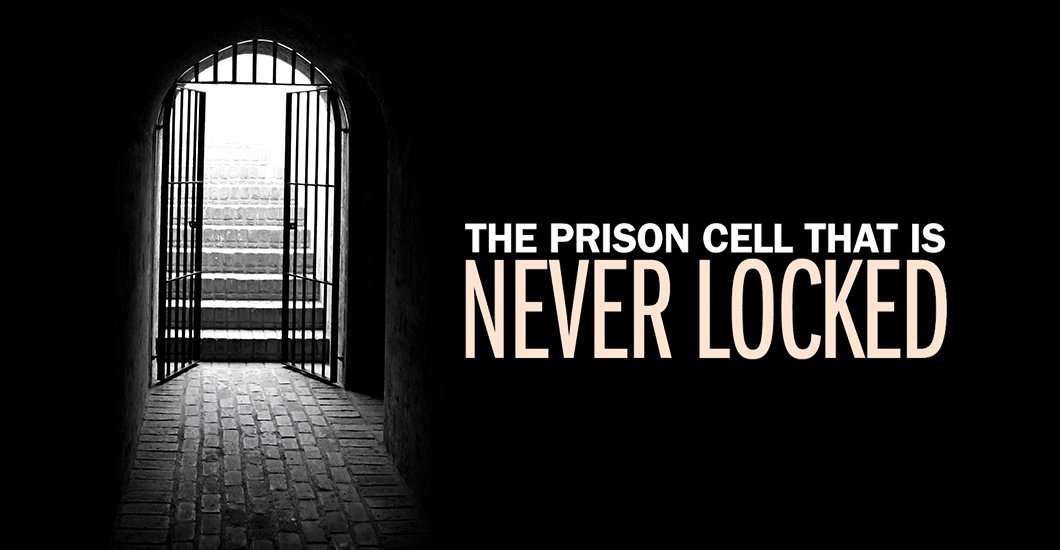Trending Articles
The Prison Cell That Is Never Locked
A quirky cartoon showed a bedraggled and disheveled prisoner probing his open cell door, calling to his gaunt cell mate, “I have some good news and bad news for you. The good news is that I just found that this cell door isn’t locked. The bad news is that all these years it never was—there’s no keyhole!” The “bad” news is the fact that countless people imprison themselves, often for years, in their self-induced guilt, and the really “bad” news is that they do not realize the “good” news that the Lord has provided an easy escape plan.
Heaven is full of sinners-turned-saints who have experienced the absurdity of that cartoon. For instance, Saint Peter Julian Eymard confessed, “After pursuing me for a long time the Lord ‘imprisoned’ me, as it were. He deprived me of everything to force me to focus on Him, but invariably I returned to the nothingness of worldly interests, shunning the abyss of His love.”
Why would anyone choose to live in a prison cell when not forced to do so? Or wallow in the sludge of oppressive, negative feelings of guilt, when a simple cleansing of the filth is almost absurdly within reach? Our heavenly Father, in His ineffably impulsive divine love, can hardly wait to “forgive us our trespasses.” The spirit-breathed inspiration of the prophet Micah articulates this amazing truth as a question for devotees of pagan gods: “Who is a God like you, pardoning iniquity and passing over the transgression?” (Micah 7:18).
Imagine a person so dysfunctional that he shuts himself up in a dark, stuffy cave, and closes the entrance so tightly that not the slightest ray of sunlight can penetrate the darkness. Would anyone blame the sun for the darkness of the cave? In response we would want to scream, “Open the entrance of the cave and let in some sunlight! Better still, come outside and bask in the brilliant warmth of this beautiful day!” The “good news” is God’s gift offered to every despondent heart: “In your presence there is fullness of joy” (Psalm 16:11).
The “Catechism of the Catholic Church” (CCC) explains how God’s loving mercy overrides His righteous indignation at the horrendous evil of sin, which is an act of insulting the Creator of the universe. “When the sinner takes the tiniest step toward His waiting open arms, he is embraced in a flood of the warmest affection from a God whose tenderness and love totals far more than all the human love added up from the beginning of human existence on earth.” Few will deny that God’s wisdom or power is infinite—although no one can really grasp it. God’s infinite mercy is a concept that many prisoners of their own guilt find hard to appreciate. As Paul says (2
Corinthians 4:4), “In their case the god of this world has blinded the minds of the unbelievers, to keep them from seeing the light of the gospel.” They cannot perform God’s simple requirement for soul freedom: “Repent and turn to God so that your sins may be wiped out” (Acts 3:19).
THE SIX PORTALS OF GOD’S MERCY
From their self-imprisonment, they may be aware of the “no-keyhole door,” but they may be unaware that their cell has a number of unlocked doors to afford them their escape from the self-confinement of sin. The Bible speaks of six such portals of God’s mercy—three of which are sacraments—but implied for each one is the prerequisite of a repentant heart.
First, of course, is the “start-off-clean” sacrament of baptism that removes original sin, which is “contracted, not committed—a state and not an act” (CCC 404), described in Romans 5:12. In the baptism of non infants, repented personal sin is also remitted: “Repent, and be baptized, every one of you, in the name of Jesus Christ so that your sins may be forgiven” (Acts 2:38). Second is the sacrament of reconciliation (often improperly called “confession,” which is only the penitent’s act of relating his sins to the priest). This sacrament is the most perfect “door of escape from the prison cell of sin” because it was instituted by Jesus precisely for that purpose alone. It was to be channeled only through the Apostles and their clergy successors: “As the Father has sent me, so I send you … If you forgive the sins of any, they are forgiven them; if you retain the sins of any, they are retained” (John 20:21-23).
Besides conferring God’s “negative mercy”—sin removal—this sacrament also confers more of God’s “positive mercy,” namely, a restoration or increase of sanctifying grace (2 Peter 1:4); a surge of actual grace to discern better what is sinful and motivation to avoid it (Philippians. 2:13); an inflow of sacramental grace that intensifies contrition (2 Corinthians 7:10); an increase of merit, i.e., heavenly reward (1 Corinthians 3:8); an added indulgence—a lessening, shortening or dissolving of accumulated purgatorial suffering (1 Corinthians 3:13-15); and, finally, a deep spiritual encounter with Christ, the Good Shepherd, in His gentle mercy (Matthew 11:28).
The third portal-sacrament of mercy is the sacrament of the anointing of the sick, formerly called “Extreme Unction.” “Are any among you sick? They should call for the elders of the church and have them pray over them, anointing them with oil in the name of the Lord … and the Lord will raise them up; and anyone who has committed sins will be forgiven” (James 5:14-15).
The fourth portal of mercy is contrition—either “perfect” (based on love of God) or “imperfect,” also called “attrition” (based on fear of punishment) (John 5:16-17)—can educe forgiveness of sin. Without sacramental confession and its many special advantages, perfect contrition by itself, even prior to confession, would suffice to remove mortal sin. However, ecclesiastical law, not divine law, requires that before receiving communion any such already-forgiven mortal sins be “submitted to the keys” of the Church’s power in the sacrament of reconciliation, if available). Meanwhile, if no confession is available, or if the sins are doubtfully mortal, communion may be received after a preparation by perfect contrition. Imperfect contrition without confession is not a sufficient preparation for communion after mortal or doubtfully mortal sin. But with a valid confession, even imperfect contrition suffices to remove any sin. All of this was affirmed by the Council of Trent.
Fifth, an act of sincere love of God would imply a deep regret at having offended Him as the beloved of the soul. This would implicitly contain an act of perfect contrition and, hence, would be conditioned on the above statements regarding perfect contrition. “I tell you, her sins, which were many, have been forgiven; hence she has shown great love. But the one to whom little is forgiven, loves little” (Luke 7:47).
Sixth, an act of sincere fraternal charity—that is, an act of love of God as His presence is recognized in another human: “We know that we have passed from death to life because we love one another. Whoever does not love abides in death” (1 John 3:14). This Christ focused fraternal charity would also implicitly contain perfect contrition and would be subject to the same conditions.
From these six routes of “escape from the prison of sin,” we can only marvel at how the Lord strives to give us every opportunity to be free of sin’s bondage and confinement. It seems that He strives to exhaust His divine ingenuity in finding ways to shower us with His loving mercy. All that is required of us is to reach out to Him to be caught up into His embrace of mercy.
A classic bumper sticker says, “If you feel far from God, guess who moved!” That is a reversible separation, as David showed in his simple prayer: “Draw near to me, redeem me, set me free” (Psalm 69:18). Yet, countless souls have become calloused by not recognizing the Lord’s yearning to embrace us and “nuzzle us to His divine cheek.” “I took them up in my arms; but they did not know that I healed them. I led them with cords of human kindness, with bands of love … like those who lift infants to their cheeks” (Hosea 11:3-4).
A passenger next to me on a flight noticed my Roman collar and soon engaged me in a conversation about religion, remarking that he had given up his childhood faith, “because,” he said, “the Bible speaks so much about the wrath of God.” He was incredulous when I told him that every such passage was qualified by the option offered to every sinner to evade such wrath by turning to God’s mercy, and that the mercy of God was mentioned in the Bible directly in more than 400 places and indirectly in hundreds of other places, from mercy parables (as in Luke 15) to psalm-prayers.
When he brought up the time-worn objection about Jesus’ referral to the “unforgivable sin,” I explained that any sin that is “unforgivable” is not unforgivable by reason of God’s refusal to forgive, but by the sinner’s refusal to be forgiven. The sinner refuses forgiveness by simply refusing to apologize to God (repentance) for spitting in His face by sin. The Lord patiently and lovingly urges the sinner to accept His divine forgiveness, but the recalcitrant sinner simply refuses to accept it. I showed my fellow passenger a statement from the “Catechism,” a copy of which, providentially, I happened to have in my valise. I urged him to read, not just the opening words of the passage but the entire paragraph. It started with the words of Jesus: “I tell you, every sin and blasphemy will be forgiven men, but the blasphemy against the Spirit will not be forgiven.” Then followed the CCC commentary: “There are no limits to the mercy of
God, but anyone who deliberately refuses to accept His mercy by repentance rejects the offer of salvation with the forgiveness of his sins. Such hardness of heart can lead to final impenitence and eternal loss” (CCC 1864). The third personality in God’s triple-personality, the Holy Spirit, acts as grace bestower. Thus, “blasphemy against the Spirit” is simply refusal to accept God’s grace of forgiveness and salvation.
I tried explaining this by a simple kindergarten-level illustration: “If you were poor and I offered you a no strings- attached gift of a million dollars and you refused it, could you blame me for selfishness or injustice? Your being deprived of the gift would have been your choice, not mine. Counterpoint that example with the passages about the “unforgivable sin,’ coupled with the inspired words of Peter: ‘The Lord is … is patient with you, not wanting any to perish, but all to come to repentance” (2 Peter 3:9).
I told this gentleman that the world’s worst sinner can be forgiven in a fraction of a second by simply saying to the Lord, with true sincerity, “I’m sorry.” Refusing to do so is the only way one can end up in hell. The unrepentant sinner says, in effect, that he is prepared to accept the endless anguish of hell rather than humble himself by opening himself to God’s mercy by a simple apology (repentance). I showed my fellow passenger that instead of distortedly emphasizing the wrath of God, he should emphasize the pride and absurdity of any sinner remaining unrepentant. The wrath of God is mentioned in the Bible only in the context of the obdurate and sustained refusal of persons or nations who snub His loving mercy. The devil knows that pride is the main roadblock to repentance and ultimately salvation. “God opposes the proud,” says James, “but gives grace to the humble … Submit yourselves therefore to God … Draw near to God, and he will draw near to you. Cleanse your hands, you sinners, and purify your hearts … Humble yourselves before the Lord, and He will exalt you” (James 4:6-10). The most profound act of the virtue of humility is a sinner’s heartfelt utterance of two simple words, “I’m sorry!” Recall Jesus’ simple but convicting parable of the publican versus the prideful Pharisee; both prayed, but only the publican’s humble prayer for mercy was answered.
I explained to my seat companion that the God from whom we have distanced ourselves will make a thousand steps toward us if we will only make the first step toward Him. That is what James means in stating, “Draw near to God and He will draw near to you.” It is the best scriptural answer to the poignant bumper sticker question: “If you feel far from God, guess who moved!”
When I opened my Bible and showed him just a few descriptions of God’s tender mercy, such as the parable about the Prodigal Son, his acrimony seemed to melt. I invited him to say, “I’m truly sorry, Lord”—while accepting his salvation earned for him by Jesus’ death. He hastened to blurt out that commitment—almost tearfully. His parting words were words of gratitude and a promise to return to the practice of his Christian faith. By his response to God’s grace he had changed in a moment from reprobate to righteous. Truly, “the hope of the righteous ends in gladness” (Proverbs 10:28).
This encounter left me with a grateful heart as well, as I recalled the words of James 5:20: “Whoever brings back a sinner from wandering will save the sinner’s soul from death and will cover a multitude of [his own] sins.” I had simply shown him that his prison cell of guilt had never been locked. By the nudge of the awesome mercy of God he had only to open the unlocked door and find himself free—and “if the Son sets you free, you will be free indeed” (John 8:36).
Father John H. Hampsch, C.M.F. was ordained as a Catholic priest in 1952, is a member of the Claretian Missionaries, and is founder and director of the Claretian Teaching Ministry (www.CatholicBooks.net). Listed in Who’s Who in Religion in America, he has served as parish priest, seminary professor and rector, college professor, lecturer, magazine writer, newspaper columnist, editor, retreat master, hospital chaplain, prison chaplain, campus chaplain, Cursillo director and director of suicide prevention programs in Texas and California. Father Hampsch earned degrees in philosophy from Loyola-Marymount University in Los Angeles and from Notre Dame University, with postgraduate work in ascetical and mystical theology at the University of Southern California and the Dominican House of Studies in River Forest, Illinois.
Latest Articles
Want to be in the loop?
Get the latest updates from Tidings!








